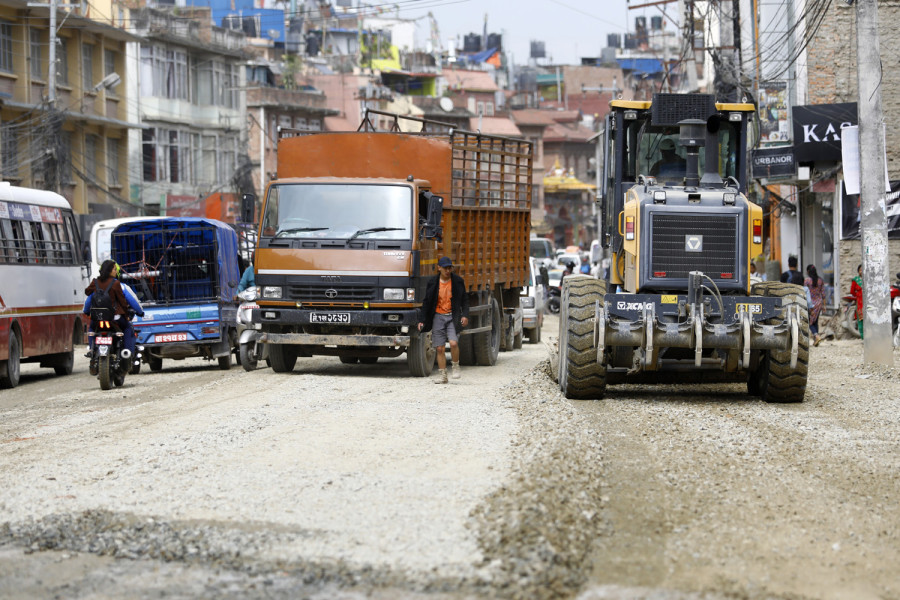National
Federal government’s reluctance to devolve power is reflected in small development projects
Unitary mindset and politicians’ interest in road and bridge projects are defeating the purpose of federalism, experts say.
Prithvi Man Shrestha
Even four years after the promulgation of the constitution that ensured federalism—the form of governance that devolves power to sub-national governments—the unitary mindset in Kathmandu continues to rule the roost, which experts say defeats the entire purpose of the federal design.
One example among many are projects handled by the Department of Roads, an agency under the Ministry of Physical Infrastructure of the federal government.
[Read: Federal government refuses to devolve authority to the provinces]
The Department of Roads has retained a large number of small roads and bridges—and almost all of its human resources—with it even though they should have been executed by provincial and local governments as per the constitution.
According to the department, it is currently implementing around 2,000 road and bridge projects which were supposed to be implemented through the provincial and local governments. On the other hand, the department’s employees also continue to remain under the federal government.
Shivahari Sapkota, spokesperson for the department, said none of the department’s employees is working under the provincial and local governments.
Although 14 division road offices of the department were brought under the provincial governments—two in each province—its employees working in the respective offices report to the federal government.
According to Sapkota, the department employees are working in their respective provinces for the projects which are under the federal government and provincial governments.
“Once the provincial governments make fresh recruitments at these offices, current employees working in the provinces will return to the department,” said Sapkota.
Experts say retaining such small projects and the employees suggests the federal government’s reluctance to devolve power to provincial and local governments.
“This is the result of the unitary mindset in Kathmandu,” said Khimlal Devkota, an expert on federalism, who also worked as vice-chairman of Policy Commission of Province 3 government until recently.
Schedule 5 of the constitution says national highways come under the jurisdiction of the federal government while Schedule 6 says provincial highways should be dealt with by provinces. Similarly, Schedule 8 gives power to the local level governments to build small roads.
According to the department, it has been implementing 1,137 local bridges being built on the roads that are under the provincial and local governments.
Likewise, as many as 442 roads under Road Infrastructure Development Programme and 404 roads under the Tarai Madhes Road Infrastructure Special Programme, whose budget is less than Rs10 million each, are also being implemented by the department.
The projects under Road Infrastructure Development Projects are mostly being implemented in the hilly areas while the roads under the Tarai Madhes Road Infrastructure Special Programme are being implemented in the Tarai region.
Though department officials say provinces and local governments should have been handling these projects, they are still under the department largely because most of them were chosen for “political purposes.”
“They should come under the jurisdiction of the provincial or local governments,” admitted Sapkota. He, however, said that it was a political decision whether to keep certain projects under the federal government or provincial or local governments. “As an implementing agency, we can just look after the projects which have been kept under our department,” said Sapkota.
As per a Cabinet decision around two years ago, bridges that should be under provincial or local governments continue to remain under the department. Officials say the federal government decided to keep them under the department because of the lack of capable technical human resources in the provinces. The federal government had plans to hand them over to the provinces after the completion of construction, they said. But it will take a few more years to complete these projects.
According to Sapkota, the total combined cost of these bridge projects stand at around Rs40 billion, while the federal government has allocated Rs4.57 billion for these bridges for the current fiscal year 2019-20.
Tulasi Sitaula, a former secretary at the Ministry of Physical Infrastructure, said politicians are mainly to blame for the tendency to keep smaller projects under the federal government even after the country adopted federalism.
“Central level leaders and lawmakers did not want to go to provinces and local levels,” said Sitaula. “They felt it would be easy to pressure the Department of Roads for the implementation of the projects as they find it convenient to deal with officials in Kathmandu.”




 14.24°C Kathmandu
14.24°C Kathmandu















